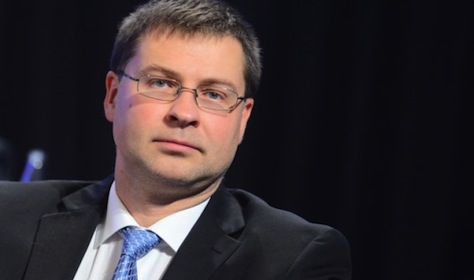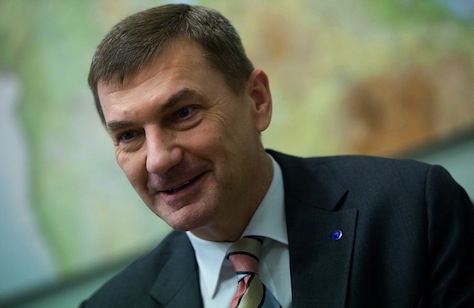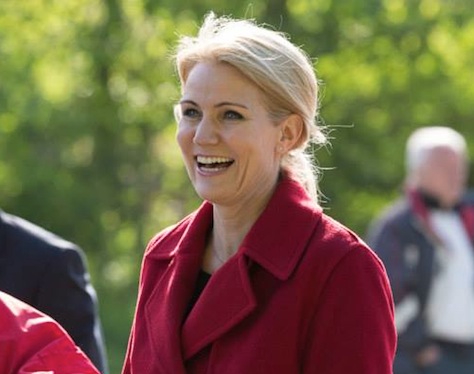When the European Council meets on Saturday for a summit of all 28 leaders within the European Union, it will not only choose a new high representative for foreign affairs and security policy, but also a new president of the European Council.![]()
It’s still very much a new role within the matrix of EU power — it was created only in 2007 as part of the Treaty of Lisbon, and Herman Van Rompuy, a former liberal Belgian prime minister, was selected in 2009 to take the role when the Lisbon Treaty came into effect.
For a position that had been, perhaps too optimistically described as the ‘presidency of Europe,’ Van Rompuy has hardly been the European Union’s George Washington. For more than three decades, the ‘president’ of the European Council, which is really just the collection of all 28 EU leaders, was the head of state or government of the country that held the six-month rotating Council presidency. That Council presidency still rotates (Italy is currently heading the Council), but the Lisbon Treaty created a full-time figure who could fill up to two 2.5-year terms to direct Council and EU policy.
* * * * *
RELATED: Forecasting the EU power summit, part 1:
Europe’s next high representative
* * * * *
But it hasn’t exactly been clear when the power of the European Commission, the chief executive and administrative body of the European Union, ends and the European Council presidency’s power begins. Often in the past five years, the roles of Van Rompuy and outgoing Commission president José Manuel Barroso, a former conservative Portuguese prime minister, have blurred.
Defining those lines will certainly be one of the most vital institutional issues that incoming Commission president Jean-Claude Juncker, a former Christian democratic prime minister of Luxembourg, and his Council counterpart, will determine in the next five years.
Even in the past 24 hours, news reports give the young Italian foreign minister Federica Mogherini an even greater edge to become Europe’s next high representative for foreign affairs and security policy, seemingly eclipsing the chances of Polish prime minister Radek Sikorski and Bulgarian European commissioner Kristalina Georgieva.
But it’s clear that the Council presidency role will follow from two factors — first, the June decision to appoint Juncker as the Commission president and, second, the decision in the next 36 hours over Europe’s foreign policy supremo.
If it’s Mogherini, as expected, the conventional wisdom is that, as Mogherini is a center-left, Italian woman, the Council presidency must go to an official from Central and Eastern Europe. That points to Polish prime minister Donald Tusk (pictured above) as the wide frontrunner for the Council presidency. If, for some reason, Tusk turns down the idea of moving from Warsaw to Brussels, former Latvian prime minister Valdis Dombrovskis, former Estonian prime minister Andrus Ansip or former Finnish prime minister Jykri Katainen, all of whom are already candidates to serve as their respective countries’ commissioners in Brussels, are ready alternatives.
If it’s Sikorski, which now seems less and less likely, the conventional wisdom is that a center-right Polish official will require the balance of a center-left woman. The frontrunner would then be Danish prime minister Helle Thorning-Schmidt.
If it’s the dark-horse candidate, Georgieva, a Bulgarian and the current European commissioner for humanitarian aid, there won’t be incredible pressure to appoint a woman as Council president, but there will be pressure to appoint a center-left official, which still favors Thorning-Schmidt. Nevertheless, a surprise choice like Georgieva for foreign policy could open deliberations to truly dark-horse candidates, including liberals like Ansip or former Commission presidential candidate and former Belgian prime minister Guy Verhofstadt.
Tusk, therefore, remains the frontrunner.
The biggest question is whether Tusk, who has served as Poland’s prime minister for the last seven years, is willing to bring an end to his career at the apex of national power just to take an uncertain role sparring with Juncker and national EU leaders like German chancellor Angela Merkel for the next five years.
With Polish parliamentary elections due before October 2015, and with the conservative and nationalist opposition narrowly leading most polls, it seems like a riskier bet for Tusk to fight for a third consecutive term leading a government dominated by his center-right Platforma Obywatelska (PO, Civic Platform), with Jarosław Kaczyński, the former prime minister and twin of his late brother, a former president who died in an airplane crash four years ago, is likely to win the election for his own Prawo i Sprawiedliwość (PiS, Law and Justice).
It seems like a much better gambit to let Sikorski remain in Poland, and try his hand at retaining power as Civic Platform’s new leader and go to Brussels. Tusk, if chosen, would be the first central or eastern European to win such an important EU position. Merkel has long preferred Tusk as her candidate, unofficially, and British prime minister David Cameron boosted Tusk loudly and publicly in the past week.
European leaders might jump at the chance to give Cameron a victory after his disastrous campaign earlier this summer to stop Juncker’s Commission presidential candidacy. With Mogherini settled as the equivalent of Europe’s foreign minister, Italy’s prime minister Matteo Renzi would happily support Tusk for the Council presidency, and France could probably agree to a Tusk presidency if its own candidate for the Commission, former finance minister Pierre Moscovici, is guaranteed an influential and weighty portfolio. Though Tusk is a center-right official, he’s much more moderate than the social conservative and often eurosceptic leaders in the competing PiS.
His biggest drawback is rather technical — he speaks little English or French, the two languages most used to communicate within EU policymaking.
If for some reason, Tusk declines, Dombrovskis (pictured above) could become a contender. Like Tusk, Dombrovskis is a center-right eastern European.
An economist, Dombrovskis served as Latvia’s finance minister from 2002 to 2004, and he most recently served as the leader of Latvia’s center-right Vienotība (Unity), leading Latvia as prime minister from 2009 until January 2014. Under his leadership, Latvia pursued relatively aggressive budget discipline and ‘austerity’ policies to avoid being pulled into Europe’s sovereign debt crisis, and he prepared Latvia for its accession to the eurozone on January 1.
He resigned, however, over the tragic collapse of a supermarket roof in Riga, the Latvian capital, last November, which killed 54 people.
Another alternative is Ansip (pictured above), a more liberal version of Dombrovskis, who comes from Estonia, to Latvia’s south.
Like Dombrovskis, Ansip felt compelled to purse an austere economic course for Estonia during his premiership, which spanned three terms from 2004 to 2014. He stepped down earlier this year as prime minister with the express desire to become Estonia’s commissioner. The chief difference from Dombrovskis, whose Latvian party Unity is part of the mainstream center-right European People’s Party (EPP), Ansip’s Eesti Reformierakond (Estonian Reform Party) is part of the liberal bloc in the European parliament.
Katainen, who served as Finland’s prime minister from 2011 to 2014, and who also resigned in favor of becoming Finland’s commissioner, is less likely. Though he was a dark-horse contender for the Commission presidency, he’s a solid center-right European federalist and his country’s proximity to Russia means that it has many of the same security concerns these days, Finland is generally considered more ‘northern’ than ‘eastern’ — it was never part of the Soviet eastern bloc, and it joined the European Union in 1995, not in the 2004 expansion.
If the Council leaders want a center-left figure as its next president, the general consensus is that they will turn to Thorning-Schmidt (pictured above).
A relatively popular prime minister in Denmark, Thorning-Schmidt leads the Socialdemokraterne (Social Democrats), the largest partner in what’s now a two-party coalition in government. Though her party did better than expected in the Ma 25 European parliamentary elections, Thorning-Schmidt will have a tough battle in national elections next year, and she was considered Cameron’s favorite alternative to Juncker as a potential Commission candidate. Though Cameron and Merkel are now both in favor of Tusk, they would easily become comfortable with Thorning-Schmidt.
Fluent in English and French, Thorning-Schmidt would add some Scandinavian cosmopolitanism to the Council presidency. But she has recently ruled herself out as a candidate, and with Mogherini’s appointment likely, it’s not certain that the Council would appoint another center-left official as its president.



